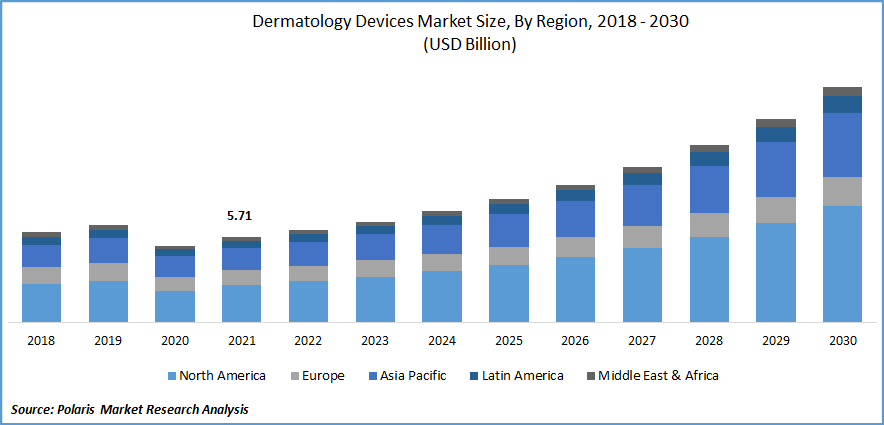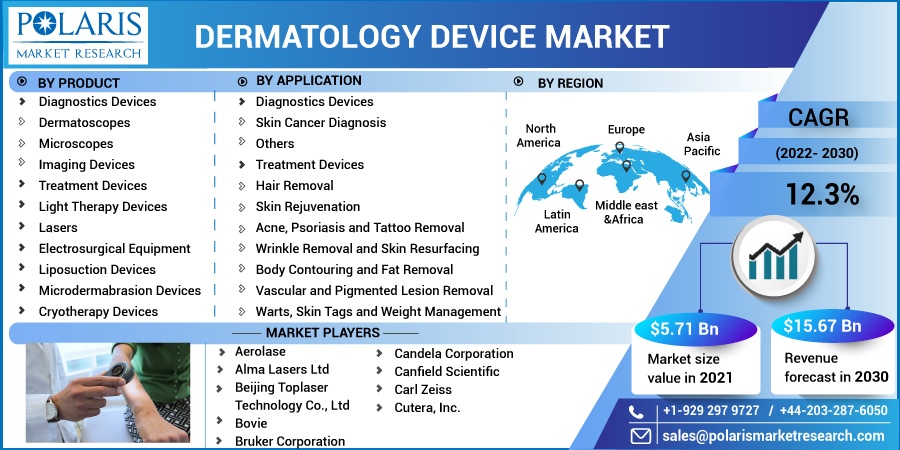
Dermatology Devices Market Share, Size, Trends, Industry Analysis Report, By Product; By Application; By Region (North America, Europe, Asia Pacific, Latin America, Middle East & Africa); Segment Forecast, 2022 - 2030
- Published Date:Oct-2022
- Pages: 115
- Format: PDF
- Report ID: PM2718
- Base Year: 2021
- Historical Data: 2018-2020
Report Outlook
The global dermatology devices market was valued at USD 5.71 billion in 2021 and is expected to grow at a CAGR of 12.3% during the forecast period. The demand for dermatology devices is expected to be driven by the prevalence of many skin disorders and skin cancers, rising consumer awareness about aesthetic appeal, and technological advancement in dermatology devices.

Know more about this report: Request for sample pages
Dermatology devices replace traditional surgical devices owing to minimal incisions and preventing unattractive scars when used for surgery. In addition, the frequent occurrence and treatment of various skin diseases, including psoriasis, acne, rosacea, vitiligo, and eczema, is expected to drive market growth.
Furthermore, the extensive usage of these devices for hair removal, cosmetic surgery, and stretch mark reduction support market growth.
The COVID-19 pandemic has negatively impacted the market. The economic slowdown has resulted in limited manufacturing operations and disruption in supply chains. In addition, many clinics and hospitals were shut down owing to government regulations and global lockdown. Furthermore, the rising infection halted various aesthetic procedures to avoid the risk of exposure, eventually halting the market.
With new technologies emerging, dermatology devices are gaining popularity for skin resurfacing, tattooing, and hair removal. However, these devices are quite expensive and not affordable by small clinics and practitioners, which is expected to hamper market growth.
Moreover, aesthetic procedures are associated with many risks and complications, such as skin irritation, burns, skin pigmentation, and organ damage which is a restraining factor toward adopting dermatology devices.
 Know more about this report: Request for sample pages
Know more about this report: Request for sample pages
Industry Dynamics
Growth Drivers
Global dermatology devices market are likely to be driven by the rising prevalence of skin conditions and the growing demand for aesthetic procedures. The increasing concerns regarding scarring wrinkles, lightening skin tone, and removal of dark spots among the geriatric population have increased the demand for these devices in the emerging nation, which is expected to drive the market over the forecast period.
Moreover, the rising need for in-house skin consultation and customized skincare recommendations is expected to support the market growth. For instance, Lancer skincare collaborated with ByondXR to explore virtual clinics, discover new products, get a free consultation, and offer better experiences in the comfort of their homes. This digital and tailored experience is boosting the market.
The rising adoption of dermatology devices due to the high occurrences of melanoma and non-melanoma skin cancer is driving the market. In addition, people living in areas with higher ozone depletion are more prone to UV light exposure, which has increased skin cancer cases. Some regions are Canada, the U.S., and the U.K., which have the highest number of cancer patients, which is expected to boost the market's revenue.
Report Segmentation
The market is primarily segmented based on product, application, and region.
|
By Product |
By Application |
By Region |
|
|
|
Know more about this report: Request for sample pages
Diagnostic Devices, by Product Accounted for the Largest Share in 2021
Diagnostic devices accounted for the highest revenue share in 2021, owing to increasing occurrences of skin disorders and the adoption of new technologies. In addition, imaging devices are expected to hold the largest share over the forecast period owing to rising cases of melanocytic lesions.
Moreover, the 3D imaging system capture image and visualize skin texture and scale. These images are generated in software where new developing lesions can be observed with maximum accuracy, which will likely complement market growth over the forecast period.
In addition, treatment devices are the second largest segment and are expected to grow over the forecast period. Laser therapy is attributed to segment growth owing to rising concerns for skin pigmentation, skin scars, deep wrinkles, and facelifts which are expected to drive the demand for the treatment devices market.
Diagnostic Devices, by Application, is Expected to Witness Faster Growth
The demand for diagnostic devices is driven by the increasing incidence of skin cancer across developing and developed economies. In addition, exposure to harmful UV and hazardous radiation fuels the market growth. Moreover, many mobile applications are being launched to detect skin cancer at early stages by imaging techniques which is expected to drive the demand for the segment over the upcoming years.
The treatment devices are expected to see a significant surge over the forecast period. The hair removal segment is expected to witness higher growth owing to the preference of the female population for hair removal equipment to enhance their aesthetic appeal. In addition, laser sittings are majorly used for hair removal as they are less painful, which is expected to contribute to market growth.
North America is Expected to Dominate and Witness the Fastest Growth over the Forecast Period
North America is the largest region for dermatology devices. It is expected to witness faster growth over the forecast period owing to the growing rates of skin disorders, awareness of cosmetic operations, accessibility of novel technologies, and rising healthcare expenditure. In addition, many key players are investing in R&D to develop therapies for skin cancer across the countries which is expected to drive demand over the forecast period.
The Asia Pacific is expected to be the second largest region for dermatology devices on account of the growing prevalence of skin cancer in developing economies, with a huge patient population in China and India. Furthermore, the rising beauty consciousness and availability of affordable treatments and their alternatives are likely to have a positive impact on revenue growth.
Competitive Insight
Some of the major players operating in the global market include Aerolase, Alma Lasers, Ltd, Beijing Toplaser Technology Co., Ltd, Bovie, Bruker Corporation, Candela Corporation, Canfield Scientific, Carl Zeiss, Cutera, Inc., Cynosure Inc., Dermlite, Fotofinder Systems Gmbh, Genesis Biosystems, Inc., Heine Optotechnik GmbH &Co. KG, Leica Microsystems, Lumenis, Ltd., Michelson Diagnostics Ltd., Olympus Corporation, Photomedex, Inc., Solta Medical, and Syneron Medical Ltd.
Recent Developments
- In March 2022, the vascular birthmarks foundation collaborated with candela, Dr. Giacomo Colletti, and laserplast to provide free laser treatments in Milan to 30 pre-qualified patients from 13 different countries.
- In April 2021, Alma launched its new product named Alma PrimeX. Basically, a platform that is helpful for body contouring and skin tightening in the abdomen, waist, thighs, and buttocks area.
Dermatology Devices Market Report Scope
|
Report Attributes |
Details |
|
Market size value in 2022 |
USD 6.18 billion |
|
Revenue forecast in 2030 |
USD 15.67 billion |
|
CAGR |
12.3% from 2022 - 2030 |
|
Base year |
2021 |
|
Historical data |
2018 - 2020 |
|
Forecast period |
2022 - 2030 |
|
Quantitative units |
Revenue in USD billion and CAGR from 2022 to 2030 |
|
Segments covered |
By Product, By Application, By Region |
|
Regional scope |
North America, Europe, Asia Pacific, Latin America, Middle East & Africa |
|
Key Companies |
Aerolase, Alma Lasers, Ltd, Beijing Toplaser Technology Co., Ltd, Bovie, Bruker Corporation, Candela Corporation, Canfield Scientific, Carl Zeiss, Cutera, Inc., Cynosure Inc., Dermlite, Fotofinder Systems Gmbh, Genesis Biosystems, Inc., Heine Optotechnik GmbH &Co. KG, Leica Microsystems, Lumenis, Ltd., Michelson Diagnostics Ltd., Olympus Corporation, Photomedex, Inc., Solta Medical, Syneron Medical Ltd. |
